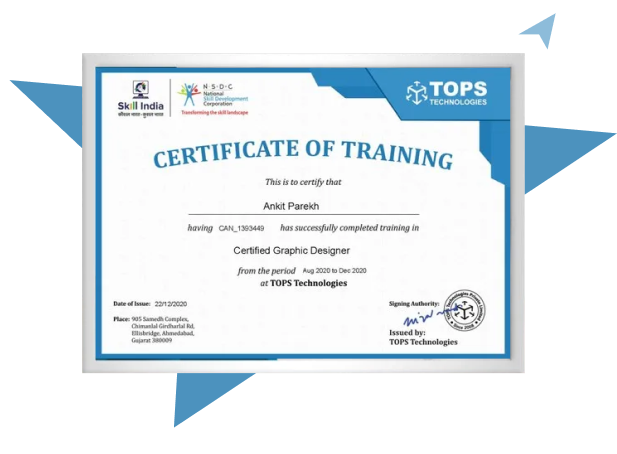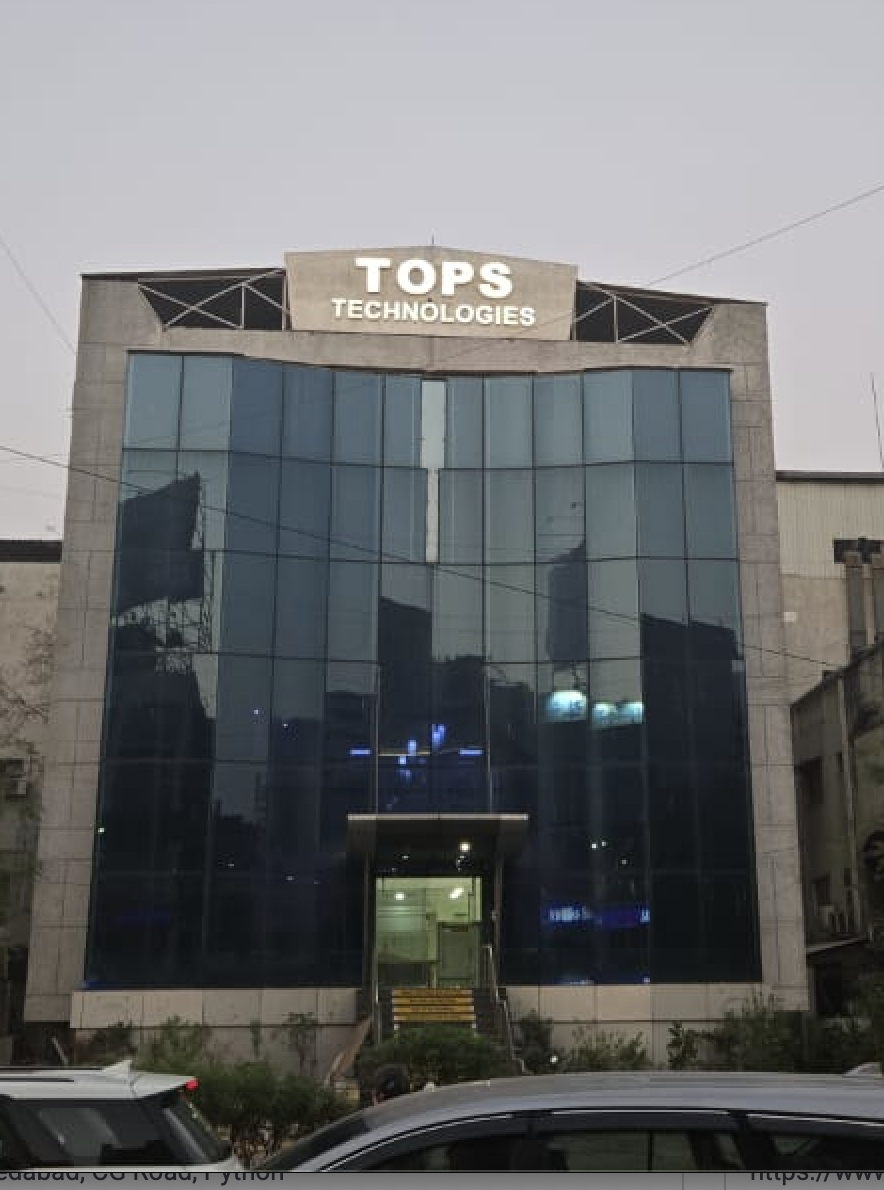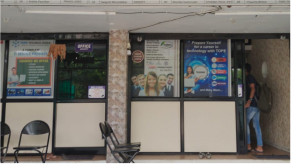Our Facts and Figures
1 Lac+
Student Placed
3000+
Companies TieUp
19+
Offices in India
50+
Industry Courses
Get 100% Job Assistance by enrolling in Certified Computer Coding for Kids
Key Highlights
Limited Students Batch
Personalised Attention
Highly Qualified Teachers
Flexible Batch Timings
Interactive Learning
Live Projects
Career Support
Job Oriented Training
Kids Computer Course Highlights
Map Your Child’s Future with Our Coding Classes in Vadodara
Enroll Your Kid in Our Computer Programming Course Today!
In this technical era, it is important that your kids learn how to solve real-life problems by thinking logically. At TOPS Technologies, our qualified instructors will make sure that your child understands the fundamentals of programming through hands-on activities and a DIY learning approach. Through our learning modules, they can develop an awareness of the latest technologies and leverage it to understand different scientific concepts. Our computer programming course in Vadodara is aimed to drive enthusiasm among kids to learn about coding through block programming and improve their logical reasoning skills gradually.
How Can Our Computer Classes in Vadodara Benefit Kids?
With our learning module, your kids will learn to use block programming to give commands to computers and understand the connected world better.
Here’s how our coding classes in Vadodara will help your kids:
- With hands-on training sessions, children will learn how to design and code games and applications.
- They will be introduced to various mathematical and scientific concepts to help them understand the technical world better.
- Our qualified tutors will teach your child to code and design basic and advanced 3D objects.
- They can enhance their knowledge about technologies such as IoT and Artificial Intelligence.
At the end of this course, your kids will have the capability to apply various programming concepts and will develop various crucial soft skills like perseverance and organizational skills to excel not only in their academics but also in their future career.
Why Choose TOPS for Your Kid’s Coding Classes in Vadodara?
With TOPS Technologies, your child can explore their interests that will help them choose the right career path in future. Our learning platform will help them with communication, science, mathematics, and creativity with expert guidance every step of the way. We provide a safe and positive learning environment for children to help them learn the logic behind codes and impart knowledge in a fun and understandable way.
Register Your Child in Our Computer Coding Classes Today!
Leverage the expertise of our qualified tutors and guide your child to learn coding from scratch. With our interactive sessions, they will learn how to design applications and games and enhance their creativity.
Prepare your child for the digital era with our computer programming course in Vadodara by calling us at +91 - 7622011173 or send us your queries at inquiry@tops-int.com!
40%
Average Salary Hike
4.5 Lacs
Highest Salary
3000+
Hiring Partners
Join Our Free Upcoming Webinar
Full Stack Development
07 Feb 2026, 11:00 AM
Trainer
Jigar Thakkar
(Sr. Technical Trainer)
Agentic AI vs Generative AI
07 Feb 2026, 03:00 PM
Trainer
Dhrumil Joshi
(Sr. Technical Trainer)
Kids Computer Course Curriculum
Download Curriculum- Basic Projects: - Make Shape, flying story
- Make Story
- Birthday Card
- 3D Infiniity/Name - Pen Extension
- Dancing Party - Goal
- Intermediate Projects:Maze Game
- Chat Bot
- Hit the sprite - video sensing ext
- Death Race
- Dodge Ball
- Dodge Ball L-2
- Platform Starter
- Platform Starter L-2
- Catch Balloons - video sensing ext
- Shark vs Scuba Man
- Shark vs Scuba Man L-2
- Shooting Defense
- space war
- Shooting Defense L-2
- Flappy Bird
- A Rainbow pin wheel - Pen Extension
- Flappy Bird L-2
- Cat and Mice
- Cat and Mice L-2
- Paddle and Brick
- Story with Text to Speech - ML
- Basketball - Video sensing Ext
- Paddle and Brick L-2
- Advance Projects: - Toxic Chemical
- Toxic Chemical L-2
- Astro Cat
- Spirograph pattern - Pen Extension
- Astro Cat L-2
- Quiz
- 3D Shark - My Blocks , Pen Ext
- Quiz L-2
- Make a Melody
- Make a Melody L-2
- Hurdle Race
- Hurdle Race L-2
- Hurdle Race L-3
- Tic Tac Toe
- Memory Game
- Memory Game L-2
- Ludo
- Mario
- Video Sensing Projects: Hit the sprite with sensing, Piano
- Selfie with camera, catch the stars, Drum playing
Our TOPS Training Centers in India
Get Training Certificate by Government
Recognized NSDC/Skill India

- National Skill Development Corporation
- Supported by the vision of PM Shri Narendra Modi
- Certification by NSDC SkillIndia
- Valid for all Jobs and College Training
- International Recognition

FAQ
Yes, coding improves math, logic, and critical thinking, which enhances overall academic performance, especially in STEM subjects.
Early coding knowledge gives kids a head start in future tech careers, builds confidence, and encourages analytical thinking, which are valuable in any field.
Yes, small tasks or fun challenges are given after each class to reinforce learning and help children practice independently.
After completion, children can move on to advanced levels, join coding clubs, or participate in coding competitions and hackathons.
You can enroll through our website or visit the nearest center. A free trial class and counseling session are also available to help you choose the right level.
While some platforms allow siblings to share access, we recommend individual accounts for each child so progress, assessments, and certificates can be tracked separately.
Instructors monitor each child’s progress and adjust lesson plans accordingly. Slow learners get extra support, while fast learners receive advanced challenges to stay engaged.
We use interactive storytelling, gamified activities, coding challenges, and rewards like badges to make each session fun and exciting.
Yes! Many modules guide kids through creating custom games, mini apps, and websites that they can showcase to friends and family.
We maintain a low ratio (typically 1:6 to 1:10) to ensure that each child receives personalized attention and timely doubt resolution.
Interview Questions
I turn coding lessons into adventures. For example, a loop becomes a knight walking through a castle repeatedly. Storytelling gives emotional context to logic, helping kids understand and remember better. It also adds excitement to each class.
I use scavenger hunts, time-limited debugging contests, and logic puzzles disguised as mini-games. These challenges are not only fun but also reinforce key coding concepts. They help kids apply what they learn in a playful, low-pressure environment.
I simplify it into three steps: Plan it, Build it, Test it. I ask questions like, "Who is your game for?", "What problem does it solve?" and "How can we improve it?" This builds a creator’s mindset, not just a coder’s mindset.
One group built an animated story about a lost cat that made decisions at each scene using conditionals. It included sound effects, custom art, and multiple endings. The project demonstrated logic, creativity, and collaboration beautifully.
I use unplugged coding games like giving each other directional commands to reach a goal, Sudoku puzzles, and card sorting activities. These activities teach sequencing, logic, and conditional thinking without using a screen, which also reduces screen fatigue.
I encourage students to personalize every project—adding their own characters, backgrounds, or storylines. This allows them to express their imagination while learning coding logic. I also hold periodic design challenges that focus more on creativity than technical complexity, giving students freedom to explore unique ideas.
I reassure the parent that each child has a unique learning curve and highlight specific achievements the child has made. I offer examples of progress in their logical thinking or creativity, not just completed projects. If needed, I suggest additional practice resources or shorter review sessions to build confidence.
Many children think coding is just typing letters or creating games instantly. I clarify that coding is like solving puzzles—it requires planning, testing, and revising. By breaking the myth and guiding them through the process patiently, I help them see coding as a structured and rewarding journey.
I assign specific roles—like designer, coder, and tester—so every child contributes uniquely. Regular check-ins and brainstorming help create a sense of teamwork. I emphasize respectful communication and listening to peers. Celebrating team achievements rather than individual ones helps build collaboration over competition.
I teach them not to share personal information online and only use safe, child-friendly platforms. We also discuss the importance of respecting others’ work and not copying code without understanding it. I introduce basic digital citizenship to ensure they grow up as responsible digital creators.










